| Conditions come good for a spinnaker start. |
| by the Rolex Fastnet Race 2009 Media Team |
 |
Photos
By Carlo
Borlenghi and Kurt Arrigo for Rolex.
Edited by Peter Andrews. |
| 17:00 GMT, August 9, 2009. |
 |
| Morning dockside rumours of delays and divisions of boats having to kedge on the start line were roundly proven wrong as the Rolex Fastnet Race fleet, as well as spectators along the Cowes shoreline, enjoyed a magnificent, colourful spinnaker start. Thankfully the unfavourable forecast for the start with no wind followed by a south westerly filling in from the west, had not panned out. Instead, a welcome 10 knots from the east arrived, propelling the 300 strong fleet westwards down the Solent. |
 |
Spectators awaiting the start of
the Rolex Fastnet Race 2009.
Photo © Rolex / Carlo Borlenghi.
|
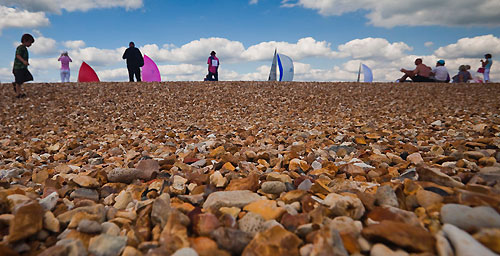 |
|
 |
First away and punching into the last of the flood tide, were the IMOCA 60s. With their ‘big gear’ unfurled seconds before the start, it was Dee Caffari’s Aviva that made the most positive start towards the pin end. However she was soon overhauled by Seb Josse on BT IMOCA 60, sailing in slightly better breeze on the island side of the course.
By the 14:30 GMT position report, the leading IMOCA 60s were already halfway across Christchurch Bay with Mike Sanderson’s Pindar leading, narrowly ahead of Aviva, BT and Arnaud Boissieres’ Akena Verandas. |
 |
The start of
the IRC Division in the Rolex Fastnet Race 2009.
Photo © Rolex / Kurt Arrigo.
|
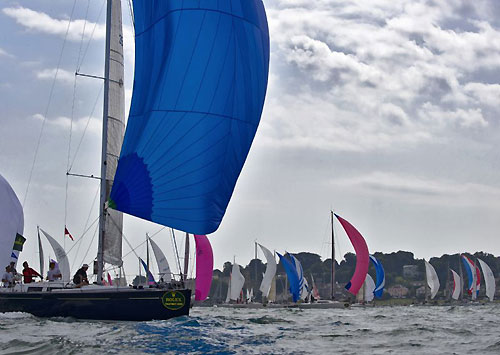 |
|
 |
With the tide having turned favourable to flush the remaining classes west, it was the small IRC classes that were next up. By the 14:30 GMT update, they too were out through the Needles, with David Lees’ High Tension 36 Hephzibah, leading from the 2005 Rolex Fastnet Race winner Iromiguy, Jean-Yves Chateau’s Nicholson 33 in IRC 3B, just ahead of David Collins’ Swan 43 Cisne, leader in IRC 3A.
For the boats heading west down the Solent, the transition to the south westerly breeze occurred for most off Yarmouth, resulting in a short lull before they were put hard on the wind. Fortunately the boats were driven west towards the new breeze by the tide. |
 |
Spanish entry, the IMOCA 60 Pakea
Bizkaia, at the start of the Rolex Fastnet Race 2009.
Photo © Rolex / Kurt Arrigo.
|
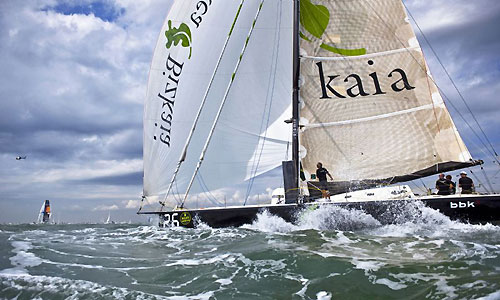 |
|
 |
With the largest boats catching up the smaller ones, Christchurch Bay was becoming grid-locked mid-afternoon. IRC 2 leaders David McLeman's J/109 Offbeat and David Walter’s J/39 Jackdaw however, managed to cruise most of the way through the Class 3 fleet, as had Jacques Pelletier’s X-43 L’Ange de Milon and Andrew Jackson’s First 40.7 Genie, leading their respective halves of IRC 1.
Despite having started an hour later than the IRC 3 boats, even the IRC Zero fleet had caught up, with John Shepherd’s Ker 46 Fair Do’s VII leading on the water from Jack Pringle’s Farr 45 Fraxious. |
 |
The Fastnet Race fleet in the Solent,
after the start of the Rolex Fastnet Race 2009.
Photo © Rolex / Carlo Borlenghi.
|
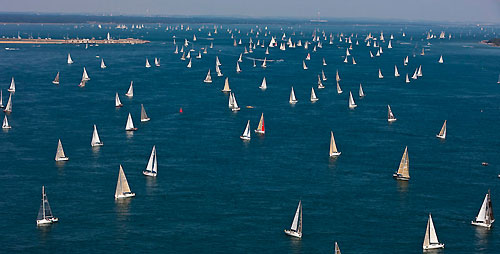 |
|
 |
In their planning of the starts, the Royal Ocean Racing Club had left the best to last. On schedule at 13:40 GMT, it was the turn of the Class 40s to take their start with the breeze still from the east. Here it was the two Verdier designs, Giovanni Soldini’s Telecom Italia and the Felippe Cubillos’ Chilean yacht Desafio Cabo de Hornos which made the best starts.
By the time they exited the Solent, Soldini was tied for the lead with Andrew Dawson’s Spliff and Mike West’s Kerlaria. Five to six miles short of St Alban’s Head at 16:00 GMT, Tanguy de LaMotte reported from the Class 40 Initiatives Saveurs - Novedia Group that they were upwind, albeit port tack favoured and that having put in a few tacks to get offshore. They were making 5-6 knots, but the wind was slowly dying on them. |
 |
The Fastnet Race fleet passing the
Needles, during the Rolex Fastnet Race 2009.
Photo © Rolex / Carlo Borlenghi.
|
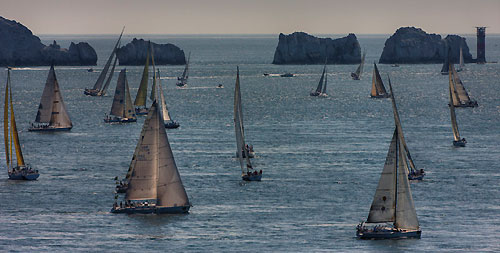 |
|
 |
Finally there came the biggest boats in the fleet, led off the line by Mike Slade’s towering Rolex Fastnet Race record holder, the 100ft super-maxi, ICAP Leopard. Luna Rossa, with Flavio Flavini helming and Volvo Ocean Race winner Torben Grael on tactics, followed in their wake with Niklas Zennstrom’s Ran 2 leading Karl Kwok’s Farr 80, Beau Geste up the mainland side.
By the 15:00 GMT update, ICAP Leopard had already pulled ahead of all the IRC boats with only the IMOCA 60s ahead of her on the water.
Among the Mini Maxis Beau Geste, thanks to her longer waterline length, had pulled ahead of Ran 2 and the STP65s Luna Rossa and Rosebud / Team DYT, although probably not enough to lead on corrected time. |
 |
Mike Slade's Farr 100, ICAP
Leopard,
leading the fleet after the start, Rolex Fastnet
Race 2009.
Photo © Rolex / Carlo Borlenghi.
|
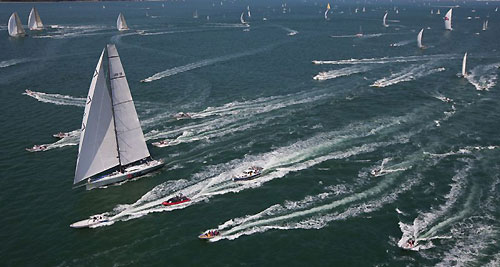 |
|
 |
Prior to the start, America’s Cup helmsman and Beau Geste skipper Gavin Brady (for whom this is his third Rolex Fastnet Race), said that they were still on a "steep learning curve phase" with their newly launched boat.
"We have had the opportunity to do three races this week which was good for us to learn the boat, but it is never fun, when you have a brand new boat, to look at the scoreboard at the end of it. So we know from onboard the boat that we have a lot more speed to get out of it, but like any new boat at the moment there is a long list of things to do to get there. If the Rolex Fastnet Race was in one month’s time we’d be a lot better off."
Like the other Mini Maxis, Beau Geste has a very strong crew including former Luna Rossa helmsman Francesco de Angelis and from Volvo Ocean Race winner Ericsson 4, New Zealanders David Endean and Phil Jameson. |
 |
Bowman onboard Karl Kwok's Blue
Water 80, Beau Geste, counting down for
the start of the Rolex Fastnet Race 2009.
Photo © Rolex / Carlo Borlenghi.
|
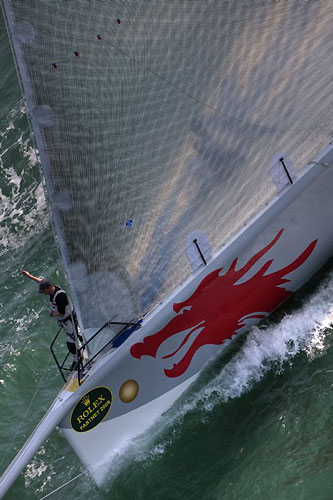 |
|
 |
In the Rolex Fastnet Race, Beau Geste has the second highest IRC rating to ICAP Leopard. But given the newness of the boat, Brady felt it unlikely they would be nipping at heels of ‘the big cat’.
"We are very respectful of the fact that they are 100-foot long with a canting keel. ICAP Leopard would have to have a pretty bad race and we'd have to have an extraordinary good race to beat them; but this race has seen strange things before and you have to navigate the Celtic Sea and the currents. I think we have an outside shot, but the rating tells the story: they owe us seven minutes an hour."
The 2009 Rolex Fastnet Race could well be decided this evening as the wind drops and the majority of the fleet struggle to make it around Portland Bill without having to kedge. |
 |
Vittorio Volonte's STP 65, Luna
Rossa, sailing down the Solent after the start
of the
Rolex Fastnet Race 2009.
Photo © Rolex / Carlo Borlenghi.
|
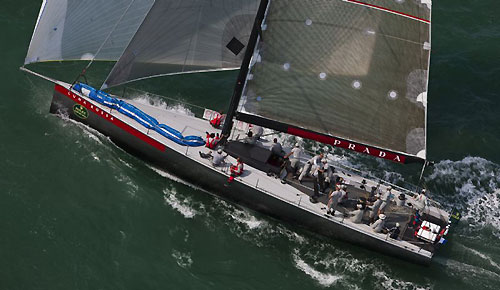 |
|
 |
Two handed Division
One of the strongest sub-divisions of the Rolex Fastnet Race fleet are the two handed, twenty eight boats sailing just two up. The 2007 winners in the class, Simon Curwen and Paul Peggs, both former Mini Transat competitors, aboard Curwen’s J/105, Voador, made a strong start in Class 2, alone in gybing early towards the island side.
Many will be following up-and-coming British solo sailing star Katie Miller, freshly returned from the singlehanded transatlantic race in her Beneteau Figaro 2, Hot Socks, which she is racing two handed in Class 1 with fellow solo sailor Hannah Jenner. Miller very nearly didn’t make the Rolex Fastnet Race start when some delamination was discovered in Hot Socks’ keel structure. Her boat was only relaunched yesterday thanks to some 11th hour assistance by Endeavour Quay in Gosport.
Despite the last minute panic, Miller was looking forward to a light wind race. "Last year the only IRC race I won my class in was when we had a really light crossing going to Cherbourg. So a bit of light upwind conditions to the Fastnet and some stronger downwind conditions back to Plymouth - that should work well for us."
The progress of the fleet can be followed by the tracking system fitted to all of the boats racing at: http://fastnet.rorc.org/2009-fleet-tracking.html.
Further information about the RORC and the Rolex Fastnet Race including a provisional entry list may be found at: fastnet.rorc.org.
|
 |
| Outimage and Rolex © 2009 |
|
|

